28/11/2024 Investment
Sierra Leone’s deficit in trade with the United Kingdom has continued to worsen. The country’s deficit jumped 6 million pounds in its trade relations with Great Britain in the one-year accounting period to June 2024. Whereas Britain total trade surplus in the one-year period to June this year improved from £35 million to a total of £41 million. It was £35 million in corresponding period of June 2023.
The figures represent total transactions in trade (in goods and services) between the two countries. The UK Trade and Investment office’s just released trading figures revealed that in the four quarters to the end of Q2 2024, the UK had a trade in goods surplus of £28 million with Sierra Leone, compared to a trade in goods surplus of £32 million in the four quarters to the end of Q2 2023. “Meanwhile, in the four quarters to the end of Q2 2024 the UK reported a trade in services surplus of £13 million with Sierra Leone.
Total trade in goods and services (exports plus imports) between the UK and Sierra Leone was £77 million during the review period. A decrease of 2.5 percent; about £2 million in current prices from the four quarters to the end of Quarter 2 of 2023. Of this £77 million total imports from the United Kingdom into Sierra Leone amounted to £59 million - an increase of 3.5 percent (about £2 million in current prices), when compared to compared to what was imported into the country in the four quarters to the end of Quarter 2 in 2023.
Conversely, export goods going to the United Kingdom from Sierra Leone during same period – four quarters to the end of quarter 2 of 2024 - amounted to £18 million; a decrease of 18.2 percent (about £4 million in current prices), compared to the four quarters to the end of Quarter 2 of 2023.
Sierra Leone retained its position as UK’s joint 156th largest trading partner during the review period accounting for less than 0.1% of total UK trade.
Data made available to FS at the UK Trade and Investment Department revealed that inward stock of foreign direct investment (FDI) from the UK in Sierra Leone was £6 million, 100.0% or £3 million higher than in 2021. In 2022, Sierra Leone accounted for less than 0.1% of the total UK inward Foreign Direct Investment (FDI) stock.
22/11/2024 Investment
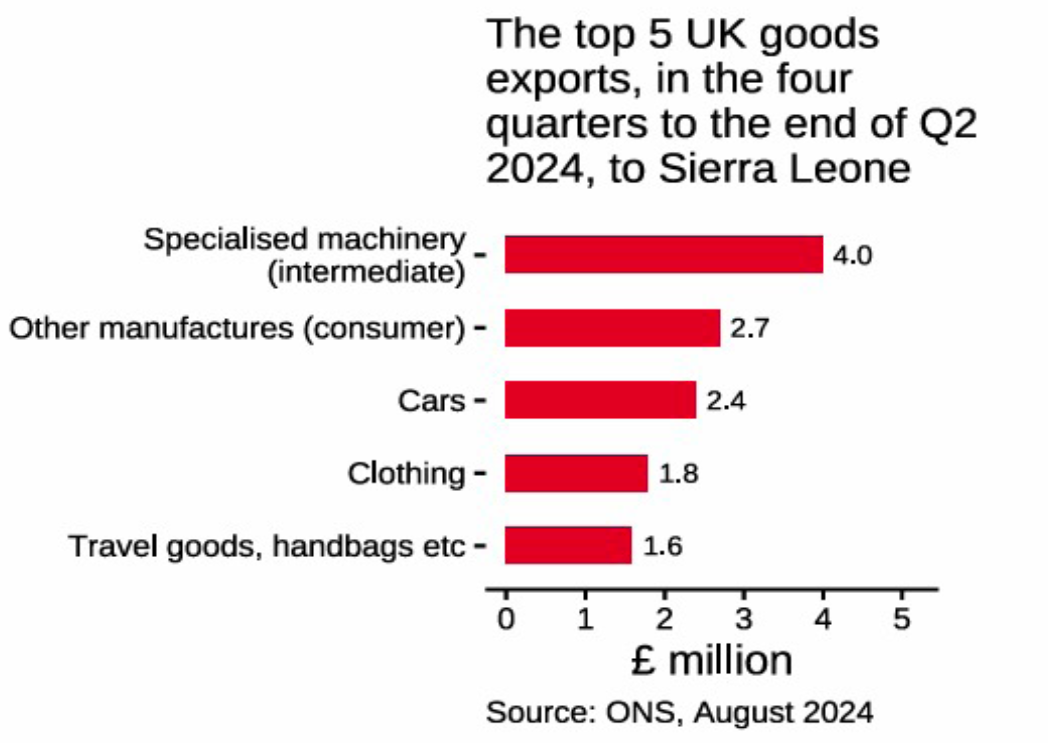
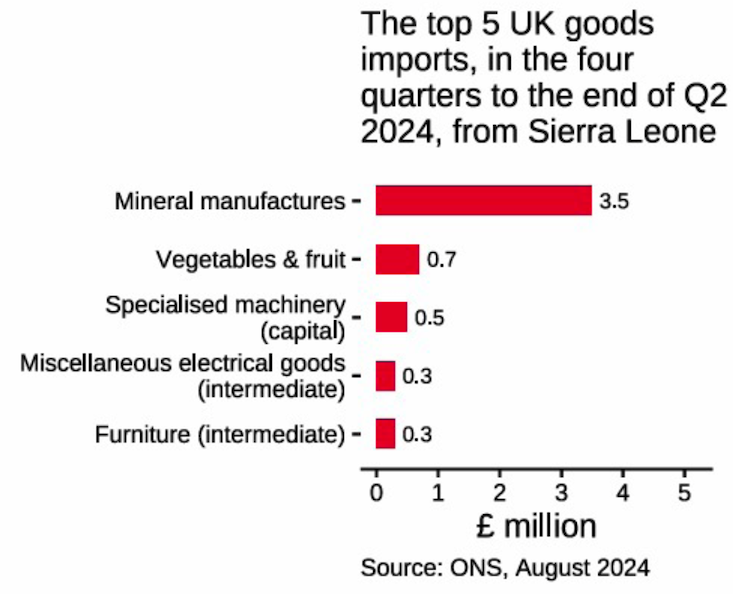
For the umpteenth time, Sierra Leone has again slipped in its trade relations with the United Kingdom. Reporting total trade in goods and services -exports plus imports – between the UK and Sierra Leone in the four quarter to end June, 2024, the UK Trade Office declared a total of £77 million pounds - a decrease of 2.5 percent or £2 million in current prices from the four quarters to the end of Q2 2023.
Of this £77 million, UK’s total exports to Sierra Leone during the review period amounted to £59 million -an improvement of 3.5 percent translating to a gain of £2 million in current prices. Sierra Leone’s exports (UK imports) during the period amounted to £18 million. A decrease of 18.2 percent or £4 million in current prices, compared to the four quarters to the end of quarter 2 in 2023.
Sierra Leone was the UK’s joint 156th largest trading partner in the four quarters to the end of Quarter 2 2024 – the period under review. It accounted for less than 0.1 percent of total UK trade during this period. In 2022, the inward stock of foreign direct investment (FDI) from the UK in Sierra Leone was £6 million, 100.0% or £3 million higher than in 2021. In 2022, Sierra Leone accounted for less than 0.1% of the total UK inward FDI stock.
The trade imbalance has always left Sierra Leone in deficit as it’s importing far more goods and services than it exports to Britain. It is an imbalance with serious implications for the country's economy with impact on several critical areas. Chief among this is the impact on the country’s foreign exchange reserve. The country requires more foreign currency, particularly the British pounds sterling to pay for its imports. The growing demand for FX automatically exerts pressure on the reserves, leading to a depreciation of the currency. A weaker Leone increases import costs, strains the economy and drives inflation.
To finance the trade imbalance, the government may have to resort to borrowing more from external sources. This could increase the country’s external debt burden. This diversion of funds can adversely affect vital sectors such as healthcare, education, and infrastructure.
Dependence on imports as shown by the trade imbalance would equally harm local employment and hinder local industries. When the market is dominated by imported goods, domestic producers struggle to compete, resulting in decreased local production, job losses, and economic stagnation. This reliance also discourages diversification and innovation within Sierra Leone's economy.
A persistent trade deficit contributes to a negative balance of payments, undermining the country's overall financial stability. This situation may deter foreign investors and obstruct Sierra Leone's ability to secure favorable trade agreements or loans.
The trade imbalance highlights structural issues within Sierra Leone’s economy, such as limited manufacturing capacity and an overreliance on exporting raw materials with low added value. For instance, Sierra Leone's exports to Britain primarily consist of commodities, while imports are predominantly finished goods, thereby perpetuating unequal trade dynamics.
To address the trade deficit, the government should adopt the following strategies to reduce reliance on imports and create jobs. Government to diversify exports and develop non-traditional export sectors, capable of increasing foreign exchange earnings. Also, leveraging partnerships to secure better access for Sierra Leonean goods in British markets can help improve the trade balance. Attracting investment in export-oriented industries can also enhance production and competitiveness. Addressing this imbalance is essential not only for improving trade relations with Britain but also for building a more resilient and self-sufficient Salone economy.
By John Marah
21/10/2024 Statistics
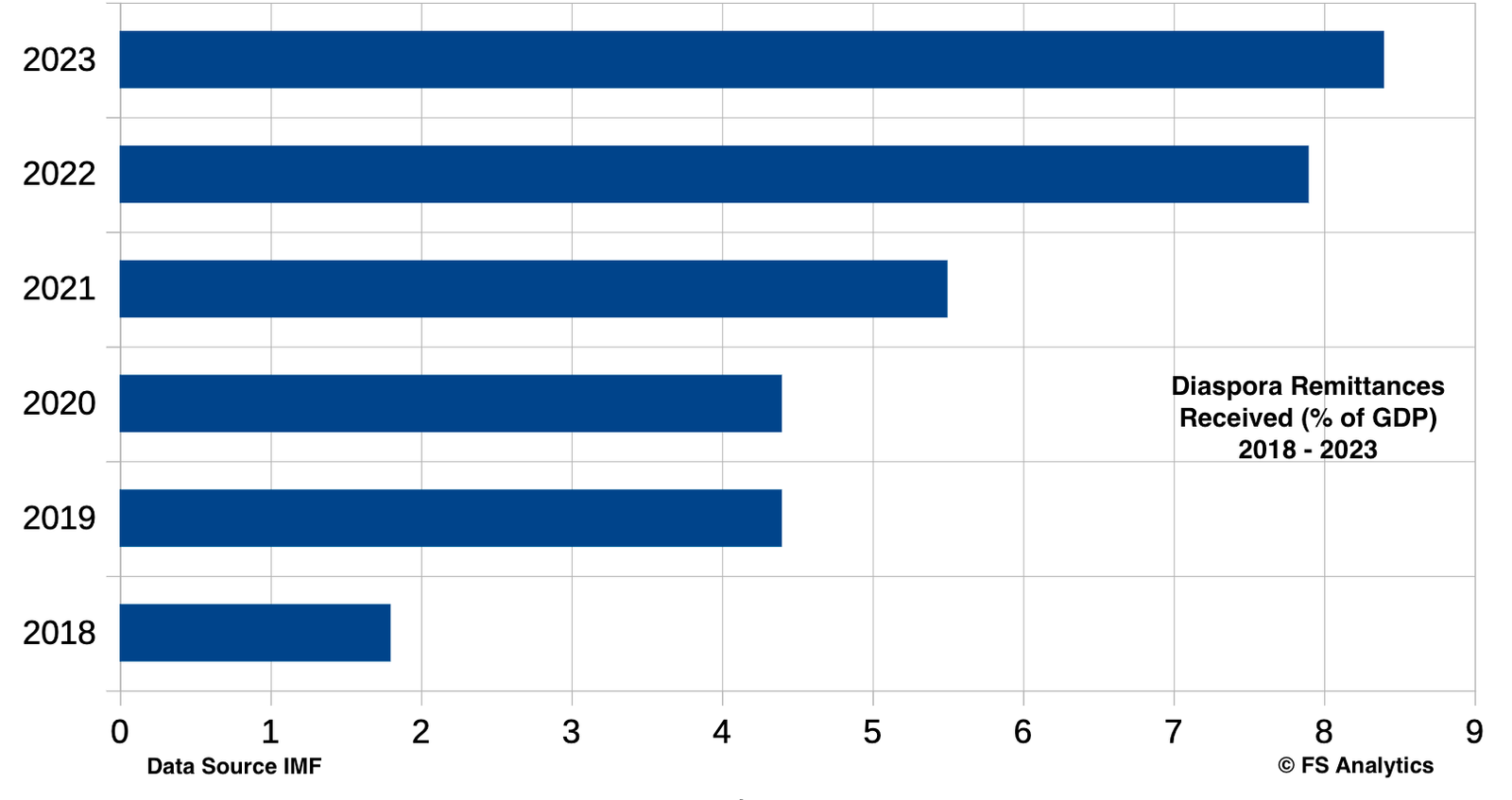 Diaspora Remmittance Graph 2018 - 2023
Diaspora Remmittance Graph 2018 - 2023
Diaspora remittaces have continued to contribute significantly to the Gross Domestic Product of the country. Latest figures revealed it accounted for approximately 8.4% of Sierra Leone’s GDP in the 5-year period to 2023.
This significant development underscores a crucial role in financial stability for many households across the country. Remittances do not only provide immediate financial relief but also help in poverty reduction, enhancement of social stability, while it also bolster local consumption.
Recent data released by the International Monetary Fund (IMF) revealed significant growth in the past 5 years as a proportion of the nation's GDP, showcasing the importance of this financial lifeline. The surge has seen a remarkable upward trend over the past years, as personal remittances for 2018 were a modest 1.8% of GDP, which ascend to 4.4% of GDP in 2019, a 2.6% growth. The figure remained stable at 4.4% in 2020 despite challenges posed by the pandemic, reflecting the resilience of the diaspora in supporting families and doing their businesses.
An increase of 1.1% of GDP reaching 5.5% in 2021 as the global economy began to recover and diaspora communities expanded their support. A testament to the critical role these funds play in local economies, 2022 recorded 7.9% of GDP, with the trend further accelerated, culminating in remittances constituting an impressive 8.4% of GDP in 2023.
As country look ahead in the last quarter of 2024, FS analysts projected that personal remittances are likely to maintain their growth trajectory, buoyed by several factors. The global economy is expected to continue improving, which could lead to higher earnings for the diaspora, further increasing their ability to send money home.
Economic experts foreseen that personal remittances may experience slight growth of approximately 9.0% of GDP in 2024. This optimistic forecast is supported by a growing recognition of the necessity for financial support among expatriates, as well as favourable exchange rates and improved access to remittance services.
The government has been making strides to improve the business environment and attract more remittance inflows. Policy measures aimed at easing restrictions on cross-border money transfers are expected to further facilitate this growth. Initiatives aimed at fostering better financial services, encouraging investment of remittances in local industries, and attracting investment from the diaspora are anticipated to further enhance the flow of remittances.
The increasing dependency on remittances as a lifeline highlights not only the importance of the diaspora but also the vulnerabilities of the local economy. With the percentage of personal remittances projected to reach 9.0% of GDP, stakeholders must consider strategies to leverage these financial flows for sustainable economic development.
Several factors have contributed to the stability and increase of remittances to Sierra Leone in recent years. With diaspora engagement remains actively in supporting back home, economic conditions and the rise of digital financial services and mobile money platforms has made sending remittances more accessible and cost-effective. Lower transaction fees and enhanced convenience have encouraged more people to partake in this financial channel.
As the trend for personal remittances is ascending on a yearly basic, this will take a substantial impact on the overall economy, the potential for remittances to contribute even more to Sierra Leone's economic stability and growth is significant. Continued focus on facilitating these financial flows, alongside addressing the underlying economic challenges, will be crucial in sustaining this momentum.
While the outlook appears promising, challenges remain. Economic volatility in key remittance sending countries could impact the ability of diaspora families to continue sending money home. Additionally, fluctuating exchange rates and inflation could erode the purchasing power of remittances, impacting their effectiveness in driving economic benefits for recipients.
By Ibrahim Mansaray
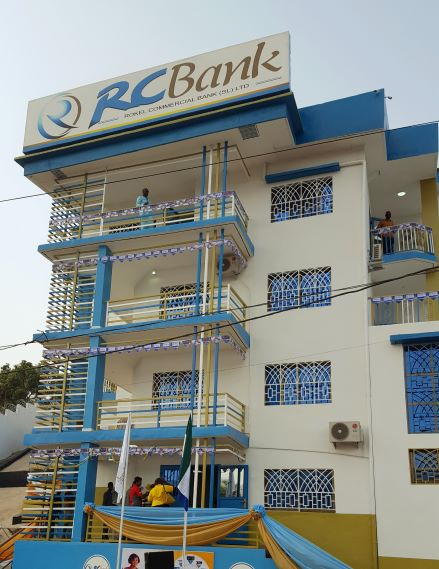
By John Marah

By Dolly Jones
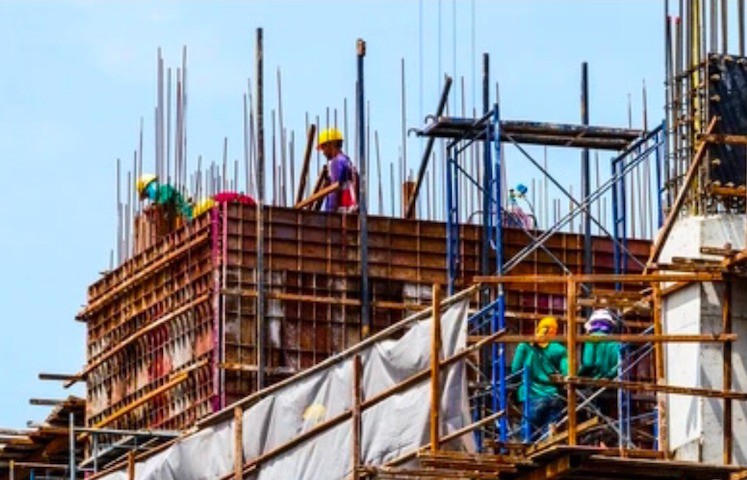
By Joan Bannister
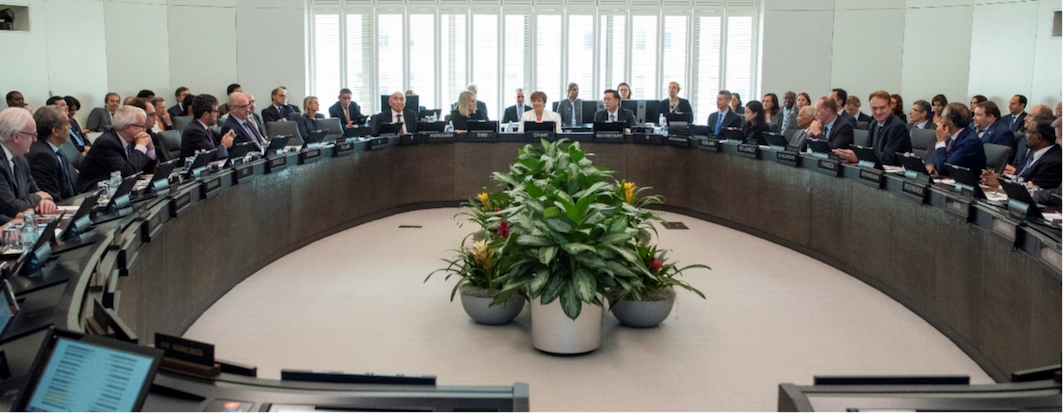
By Vicky Sawyerr